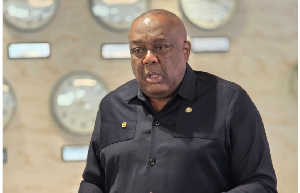Accra, March 18, GNA - Electoral Commissioner Kwadwo Afari-Gyan on Tuesday said creating equal opportunities to resource the country's political parties would make them competitive and also bolster the integrity of the electoral system.
"A political party that does not have adequate resources is seriously handicapped at winning elections, irrespective of the quality of its leadership, messages and programmes," Dr Afari-Gyan stated.
Speaking at the fifth annual "Kronti ne Akwamu - Democracy and Governance" lectures in Accra, Dr Afari-Gyan said the rules and regulations governing elections should be the same for all contestants and that the processes should always be transparent for every candidate to have a fair chance of winning. The lecture, organised by the Centre for Democratic Governance (CDD), was aimed at bridging the gap between reflection, research and analysis to enrich the
quality of public discourse on democracy and governance reforms. This year's lecture was under the topic: "The Challenges of Conducting Free and
Fair Elections in Emerging Africa Democracies: The Case of Ghana". Dr Afari-Gyan said state support for political parties would not only contribute to
a levelled playing field, but could also lead to the public demanding accountability
from the beneficiaries on how campaign moneys are used. It will also address specific issues like campaign finance and restrict the role of
money in elections, he added. He commended President John Atta Mills for publicly declaring his government's
intention to establish a fund to support political party activities. Dr Afari-Gyan cautioned against the monetisation of politics, saying it was a fertile
source of electoral corruption, as politician could buy votes and election officials.
"For this reason, credible elections call for the transparent use and accounting for campaign finance, unfortunately, this has not been the case in Ghana," he noted.
Other factors that could derail an election process are governments taking undue advantage of incumbency, personality attacks instead of issues-based political campaigns, inactions of the Police and inaccurate reportage by sections of the media, Dr Afari-Gyan added.
He said in order to achieve credible elections, it was important that all parties played by the rules and regulations and that the Police should see itself as a national institution not beholden to the government or any political party. The media should always be mindful of the fundamental rights, he said, adding that freedoms of association, movement, speech and choice must be exercised fairly to
build on the credibility of elections in Ghana.
Politics of Wednesday, 18 March 2009
Source: GNA












